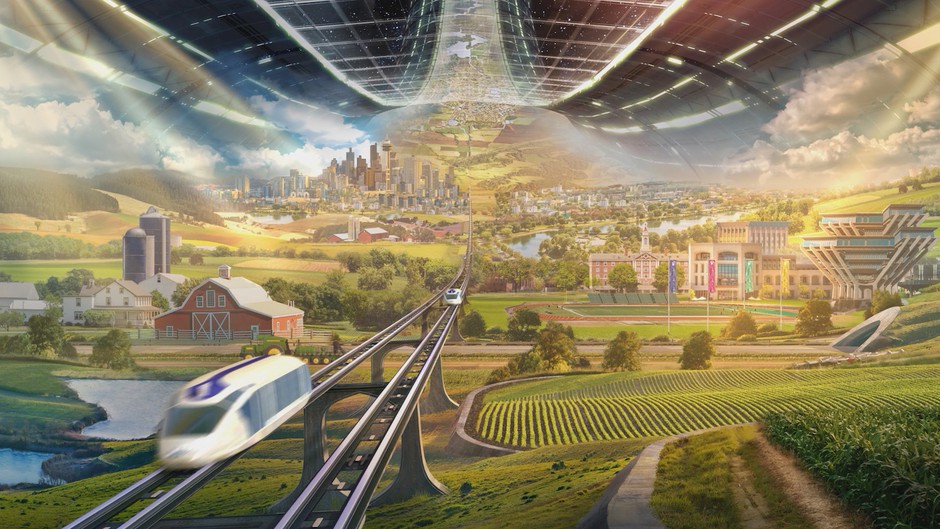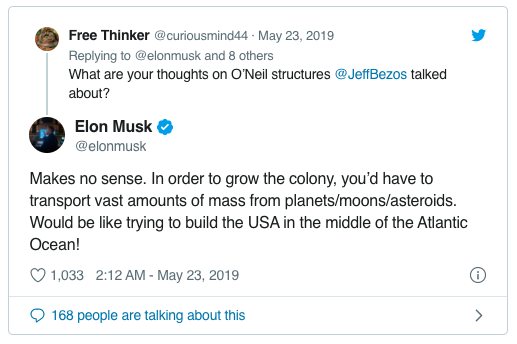In a previous article, I outlined why I think Elon Musk’s vision of massive settlements on Mars is suboptimal and not the best use of money and resources. Mars has many problems, like high levels of radiation, low gravity, it’s very far away, it’s very cold and it’s in a gravity well. Not only is it very difficult to get there, it would be very uncomfortable and impractical for large numbers of people to live there. While I love what SpaceX has done in reducing the cost of a launch, getting the U.S. capability to get our astronauts to the ISS and generating excitement for space exploration once again, and I appreciate Musk’s big vision, I think the Bezos vision for humanity is a much better plan.
Jeff Bezos is, of course, the billionaire founder of Amazon. He may be less well known for his space company, Blue Origin, and for what his long-term goals are in space. He has committed to selling at least $1 billion of his Amazon stock each year to funding Blue Origin and has been doing that for several years. In fact, Blue Origin was founded in 2000 and has since grown to over 2,500 employees.
Bezos has stated that we must get heavy industry off Earth and into space because we’re polluting the planet. His vision is to do as much heaving manufacturing in space as possible and leave Earth as one large national park. Or as he put it, Earth would be “zoned light industrial and commercial.”
The first big milestone is putting humans back on the moon by 2024. He’s not the only company or nation working toward this goal. The United States, Chinese, Europeans and a handful of private companies are all planning moon missions and settlements in the coming decade.
Besides living on the moon, which is more for scientific missions and not large settlements, where will all the industry go and where will the people who work in those industries live?
The answer is giant space stations shaped like soda cans.
Bezos foresees trillions of people eventually living and working in space. In spinning tin cans that can replicate gravity and living conditions and any environment imaginable. They can be large with thousands of people or very small with just a family. Clustered together so inhabitants can easily travel between cylinders with just a jet pack. If a cylinder wanted to move to a different cluster, it would just change orbit.
If you saw the movie “Interstellar,” remember to the end of the movie when Matthew McConaughey wakes up on Cooper Station. He looks out the window and kids are playing baseball and one puts a ball through a window of a house on the ceiling. Cooper Station is an O’Neill cylinder.
The idea was first proposed by a Princeton University physicist, Gerard K. O’Neill in 1976, in his book “The High Frontier: Human Colonies in Space.” And wouldn’t you know it, but young Jeff Bezos was in one of his classes when he attended Princeton in the mid-’80s. Professor O’Neill must have made quite an impression on Jeff.

The design of the cylinders was essentially the result of a group project in one of O’Neill’s classes in 1969. He asked them to answer this question: “Is the surface of a planet really the right place for an expanding technological civilization?” 1
They came up with a cylinder that is 20 miles long and 4 miles in diameter, with alternating bands of 3 windows and 3 habitable surfaces. The cylinder is actually 2 cylinders that spin in opposite directions to counterbalance gyroscopic effects. The manufacturing zone was planned to be on the central axis where it would be zero-gravity.
So what does Elon think of this idea? He obviously doesn’t seem to like it.
Although he says that you’d have to transport large amounts of mass from planets, moons and, asteroids but wouldn’t that be more practical than dealing with all the problems on Mars? Especially since there’s little or no gravity to deal with when getting materials from an asteroid. It’s even been proposed to just hollow out an asteroid and build inside. Then you don’t have to move nearly as much.
Let’s look at some of the benefits and advantages of building in space, rather than on a new planet – Mars or any other planet or moon, for that matter.
One of the major drawbacks of solar on Earth is that it’s not very efficient thanks to the atmosphere and that part of the day has no daylight. It gets even worse in the northern latitudes where there’s not much sunlight much of the year.
In space, there’s no atmosphere or night-time to reduce the effectiveness of solar panels so the efficiency of panels is much greater.
Asteroids and the moon can be mined without pesky gravity getting in the way. NASA is working on a project to reduce the in space dependence on Earth resources.2 They’re exploring ways to produce fuel, water, oxygen, and building materials in space. This could make manufacturing in space even more cost-effective than on Earth for some industries.
If you build a new environment in space, you can regulate everything inside of it. Just like they do on the International Space Station. You can create a similar mixture of gases as those on Earth while micro-climates can simulate whatever kind of weather the inhabitants want. The weather could even be planned. Rain on Mondays. Sunny the rest of the week.
Light would come in through the ends via large mirrors that could be turned away to simulate night-time and let the inhabitants look out into dark space. But also to let out heat for part of the day.
There are several effective ways to shield from radiation. One of the best is to put about a meter of water between humans and space. Water acts as a shield and since the station needs water storage anyway, it serves a dual purpose.
Using this equation we can figure out how fast our big can needs to turn to create simulated gravity: a=v²/r. It will only need to rotate 28 times every hour, so given its size, hopefully, that wouldn’t make anyone nauseous. Most testing needs to be done, but having some sort of gravity that simulates Earth is a huge advantage over living on the moon or Mars.
Of course, we need to take care of the Earth we’re on now. Expanding into space for some kind of “Plan B” is a really idiotic notion. Getting heavy industry into space will help better preserve Earth and keep it cleaner and less polluted. So yes, let’s take care of Earth, but also explore the options in space. After all, the space program has given us a lot of inventions to make life better here on Earth for everyone.
For all the reasons above, and more, the Bezos vision of humanity in space is more practical than Musk’s. Of course, those cylinders have to be built and will take a lot of effort. We’re a long way off from building anything like that in space, so I’m cheering on both SpaceX and Blue Origin as they and others continue to build our capabilities to explore the solar system in a variety of ways and pave the way for further exploration, knowledge and yes, even real estate.
Read why establishing colonies are Mars is impractical in Musk vs. Bezos in Space: Whose vision is better
Footnotes
